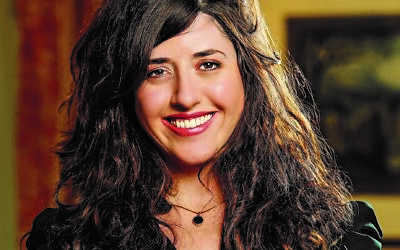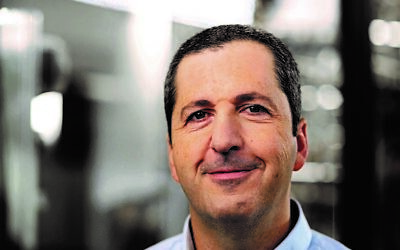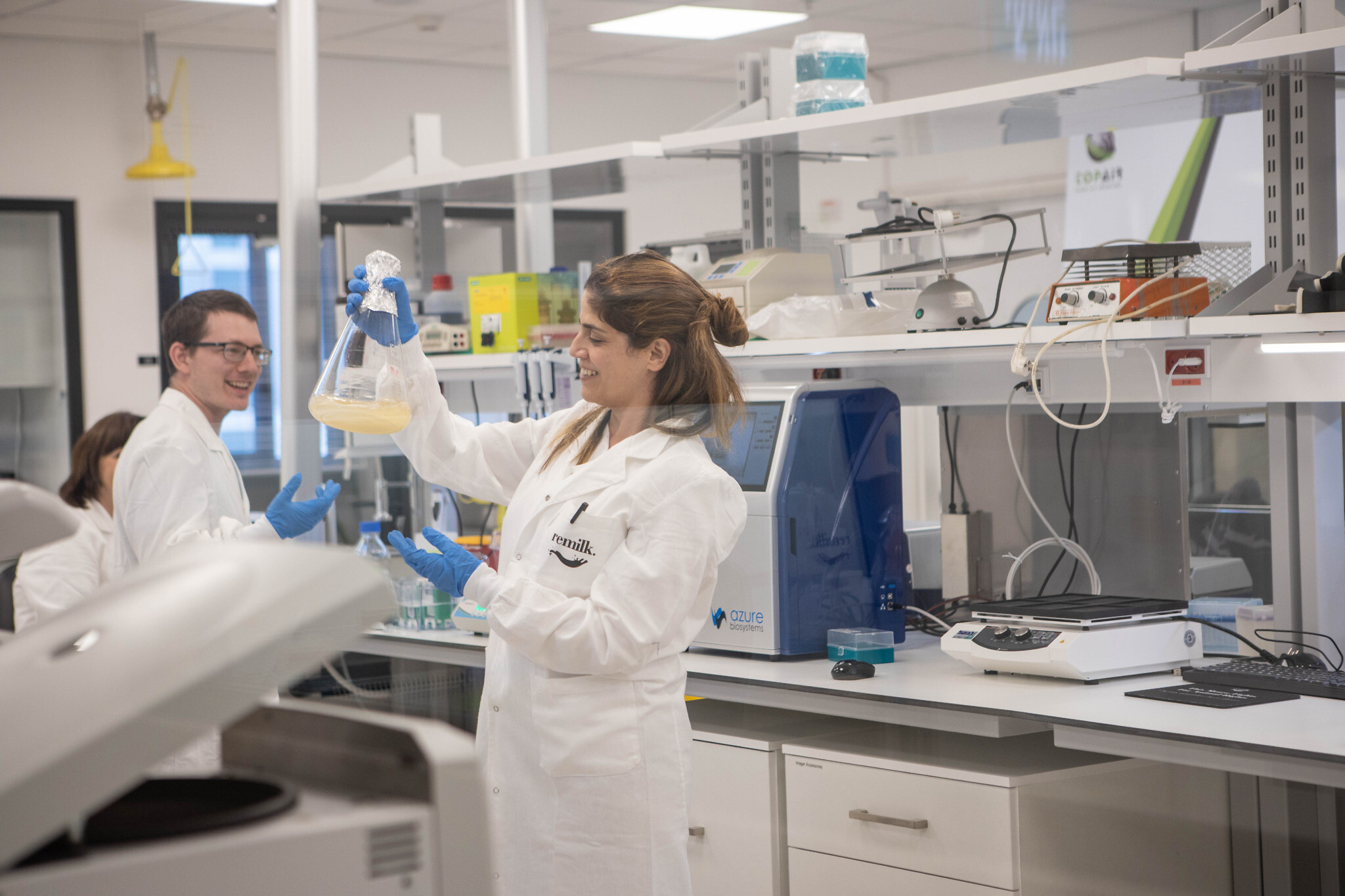Israel, the land of cultured meat and dairy
Food technology companies in Israel lead the way in alternative proteins. The founders of two such firms tell Candice Krieger why the sector is growing so fast.
From printed meat-and-fruit-fly protein to cultured meat, Israeli food technologies have exploded on to the menu with aplomb.
“Unlike the agritech sector, where Israel has been leading the way by harnessing necessity and given circumstances to formulate a strong innovation system, the foodtech is the newer, kicking kid on the block,” says Hadar Huberman, the clean growth sector lead at British Embassy Israel’s UK Israel Tech Hub team.
The ‘start-up’ nation is home to more than 400 foodtech companies, about half of which were founded in the past five years. Investment into Israel’s booming sector has soared, increasing from $53 million (£43 million) in 2015 to $866 million in 2021, according to IVC-MEITAR Israeli Tech Review 2021 report.

Foodtech covers several areas that includes nutrition, packaging, food safety, processing systems, cultured meat, novel ingredients, retail and restaurant tech, health and wellness and alternative proteins, and Israel is leading the innovation, particularly for the last of these.
Alternative protein in Israel experienced its biggest investment year on record last year, according to the Good Food Institute (GFI) Israel, with start-ups in the space raising $623 million, a 450 percent increase from 2020’s $114 million, making up 70 percent of all investments in Israeli food tech companies.
This is “perhaps due to the growing grasp in the world that food security will be one of the greatest challenges for humanity, combined with the need to mitigate the environmental-impact of farming on climate change”, notes Huberman.
According to the GFI Israel, there are more than 100 alternative protein companies in Israel – more than 40 percent are considered start-ups. They include Wilk (formerly Biomilk), MeaTech, Aleph Farms, Redefine Meat, Future Meat, and Remilk. There is also Hargol’s grasshopper protein farms, Flying SpArk’s fruit fly protein, SuperMeat, Kinoko-Tech’s mushroom-based protein and ChickP, to name just a few.
Two that are having a particular impact are cultured meat company Future Meat Technologies, which marked the largest investment gain in the foodtech start-up industry in Israel so far when it raised $347 million, and Remilk, a developer of animal-free dairy, which raised $120 million – the second-largest investment raised by an Israeli food tech start-up and the single largest in a cow-free dairy company. Remilk recently revealed it will open the world’s largest precision fermentation facility for production of cow-free milk, in Denmark.
Israel now ranks second in the world behind the US in its total number of fermentation and cultivated meat companies. And the sector is only really getting started.
Huberman says: “Regulatory approval of novel foods, which alternative proteins fall under, is the main barrier for the scale-up of these food-tech start-ups. Different countries are trying, as we speak, to build their methodology for public health-related-regulations for novel foods and, once it is developed, alternative protein start-ups would have easier market access to global clients. At the moment, these start-ups are facing barriers and very long regulation processes that put massive restraints on their ability to sell their products and/or technology around the world.
Israel now ranks second in the world behind the US in its total number of fermentation and cultivated meat companies. And the sector is only really getting started.
“Some alternative food start-ups still haven’t received their regulatory approval by any regulator, besides the Singaporean. It is estimated that once the FDA [the US Food and Drug Administration] will give them the green light, other regulators will follow, and the doors of the global industry will open.”
The Israel Innovation Authority recently approved the establishment of the cultivated meat consortium, one of the biggest in the world. Some NIS 66 million (£16 million) will be invested in the consortium over three years, half the sum by the government, to develop innovative production methods on an industrial and efficient scale to give Israel’s cultivated meat industry a competitive advantage.
Ari Ben Dror, GFI Israel’s associate director, says: “The IPCC [Intergovernmental Panel on Climate Change] has made clear that ‘transformation of food systems is needed’ if we are to stand a chance of feeding a growing population on a warming planet and it’s encouraging that the world’s top scientists have acknowledged the role alternative proteins could play in future-proofing our food system. Now governments around the world must invest in the research and infrastructure needed to make them accessible and affordable to all.
“Israel is a world leader in agricultural research and is renowned for water expertise and crop innovation. It is also a front runner in stem cell research, tissue engineering, microbiology, and nanotechnology. With this technological expertise, coupled with the nation’s entrepreneurial spirit, Israel has the potential to play a significant role in the future of food globally.”
“Israel is renowned for water expertise and crop innovation. It is also a front runner in stem cell research, tissue engineering, microbiology, and nanotechnology.
Jonathan Morris, a partner and co-leader of the Israel Practice and the Food and Agribusiness Practice at Bryan Cave Leighton Paisner (BCLP), says: “I believe Israeli involvement in the alternative protein sector will continue to expand rapidly.
“This is partly due to the success to date of companies already operating in the sector, but also for the reasons which apply to Israeli involvement in the food sector generally, namely Israel’s strength in tech innovation, the ability to think creatively and a strong fascination/connection with food generally.”

Be it alternative proteins or foodtech in general, Israel is on the cusp of something special.
Professor Yaakov Nahmias, Future Meat Technologies’ chief security officer and a professor at Hebrew University, founded the company in 2018. It produces cultured meat from animal cells without harming animals and uses a tiny fraction of environmental resources.

What is the rationale for the company?
“The demand for meat is predicted to rise by 50 percent over the next few decades. This is happening at the time where global supply of meat has peaked. The meat industry is using the vast majority of agricultural land on the plant and is a major contributor for climate change. If we are to meet this growing demand for quality protein, and protect the future, we need to fundamentally transform the industry.”
What makes Israel so well positioned when it comes to foodtech and alternative proteins in particular?
“Israel has always been a hotbed of innovation, as the diverse life experience and favourable government regulations couple with academic excellence to produce thousands of start-ups every year. Everyone who visits sees we are very passionate about food and the environment.”
Future Meat Technologies
Future Meat Technologies has raised more than $300 million to date. This last series B round was the largest in industry.
“Future Meat Technologies aims to complete regulatory approval in the first half of 2023 to bring our cultured meat products to American and Israeli customers. We are building our large-scale production facility in the US, making cultured meat affordable to the mass market.”
“There are few places where we consumers can affect climate change. Most of the decisions on decarbonisation are national, but we decide what we eat. This is why the alternative protein sector is rocketing; it’s connected to the zeitgeist of consumers who are seriously worried about the future.”
Remilk
Remilk was founded in 2019 by Aviv Wolff and Ori Cohavi, PhD in biochemistry. It is a global leader in the production of animal-free dairy through a microbial fermentation process.
What is the rationale for the company?
“We know we can’t depend on animals to provide food and nutrition for our world’s growing population because of objective obstacles, such as the amount of land and other resources they require, and sustainable reasons, including their devastating impact on our planet. We must reinvent sources of high-quality proteins to ensure a stable, reliable flow of nutritious food that are sustainably sourced.
“The revolution starts now, and as we envision it, will grow to ultimately remove animals from the food system. Remilk is positioned at the forefront of the new dairy revolution, offering animal-free milk protein that is identical to its traditional counterpart, enabling the creation of real dairy products with traditional dairy’s advantages – minus the lactose, cholesterol, and hormone and antibiotic residues. And with a fraction of the environmental impact.”
What makes Israel so well-positioned when it comes to foodtech and particularly alternative proteins?
“Israel has long been a leader in the development of bio, clean and agricultural technologies. With world-class academic institutions, an entrepreneurial spirit across the population, governmental and private support networks for innovation, Israel is positioned to be at the forefront of many new technological areas, especially deep-tech fields that require significant academic and research capabilities.”
Remilk has raised $133.3 million. The most recent series B was led by Hanaco Ventures.
Foodtech is driving the food our future depends upon.
Five-year plan? “We are on a mission to transform the dairy industry and provide quality dairy for all consumers, everywhere, in collaboration with the world’s largest manufacturers of dairy products. We are engaged with dozens of food and beverage companies, helping them to prepare for the future of dairy. We believe the next five years will see us scaling up significantly and establishing Remilk’s presence as a world leader in the production of animal-free dairy that is delicious, clean, nutritious and affordable.”
“We are witnessing some consumer fatigue with existing alt-protein, and the fact plant-based alternatives often fall short on taste, functionality or health and environmental benefits. Precision fermentation specifically offers the advantages of real dairy without lactose, cholesterol, hormones … or a single cow. Foodtech is driving the food our future depends upon.
“Israel is at the centre of the global foodtech ecosystem, driving innovation at staggering rates. The biggest question moving forward is whether the Israeli regulatory landscape will allow for successful food tech start-ups to manufacture and scale up within Israel, or if Israel will remain a start-up nation, while companies may look elsewhere for growth as they reach stages of commercialisation.”

Thank you for helping to make Jewish News the leading source of news and opinion for the UK Jewish community. Today we're asking for your invaluable help to continue putting our community first in everything we do.
For as little as £5 a month you can help sustain the vital work we do in celebrating and standing up for Jewish life in Britain.
Jewish News holds our community together and keeps us connected. Like a synagogue, it’s where people turn to feel part of something bigger. It also proudly shows the rest of Britain the vibrancy and rich culture of modern Jewish life.
You can make a quick and easy one-off or monthly contribution of £5, £10, £20 or any other sum you’re comfortable with.
100% of your donation will help us continue celebrating our community, in all its dynamic diversity...
Engaging
Being a community platform means so much more than producing a newspaper and website. One of our proudest roles is media partnering with our invaluable charities to amplify the outstanding work they do to help us all.
Celebrating
There’s no shortage of oys in the world but Jewish News takes every opportunity to celebrate the joys too, through projects like Night of Heroes, 40 Under 40 and other compelling countdowns that make the community kvell with pride.
Pioneering
In the first collaboration between media outlets from different faiths, Jewish News worked with British Muslim TV and Church Times to produce a list of young activists leading the way on interfaith understanding.
Campaigning
Royal Mail issued a stamp honouring Holocaust hero Sir Nicholas Winton after a Jewish News campaign attracted more than 100,000 backers. Jewish Newsalso produces special editions of the paper highlighting pressing issues including mental health and Holocaust remembrance.
Easy access
In an age when news is readily accessible, Jewish News provides high-quality content free online and offline, removing any financial barriers to connecting people.
Voice of our community to wider society
The Jewish News team regularly appears on TV, radio and on the pages of the national press to comment on stories about the Jewish community. Easy access to the paper on the streets of London also means Jewish News provides an invaluable window into the community for the country at large.
We hope you agree all this is worth preserving.

























